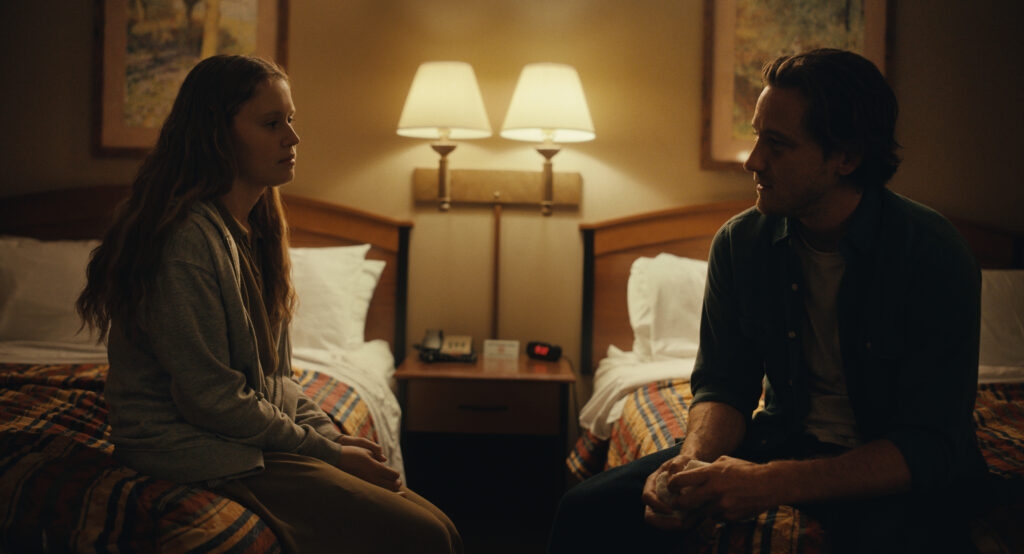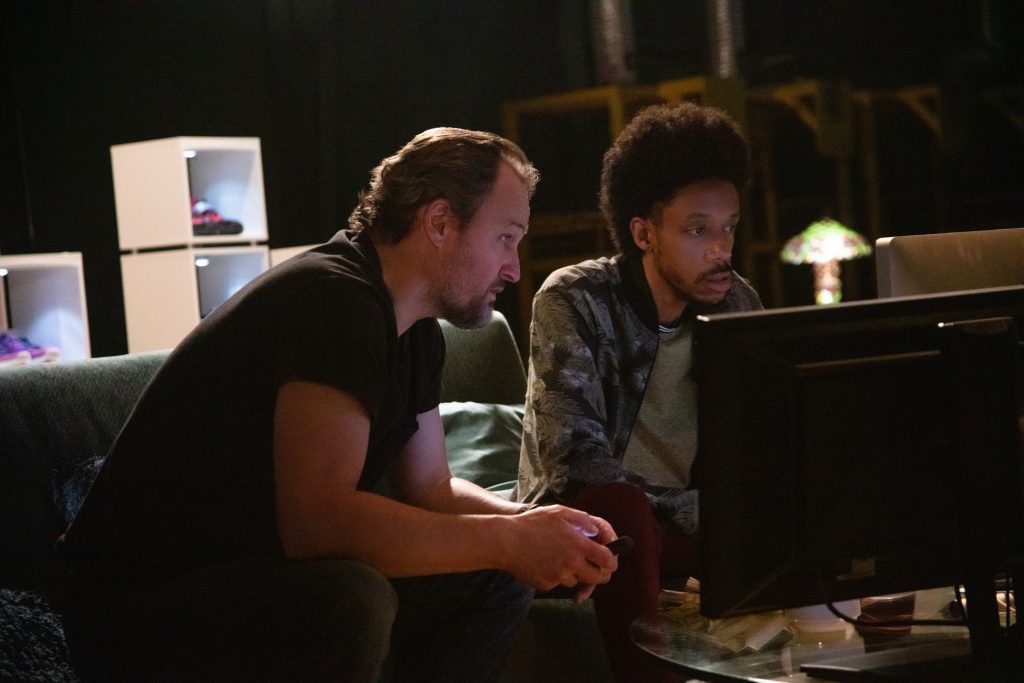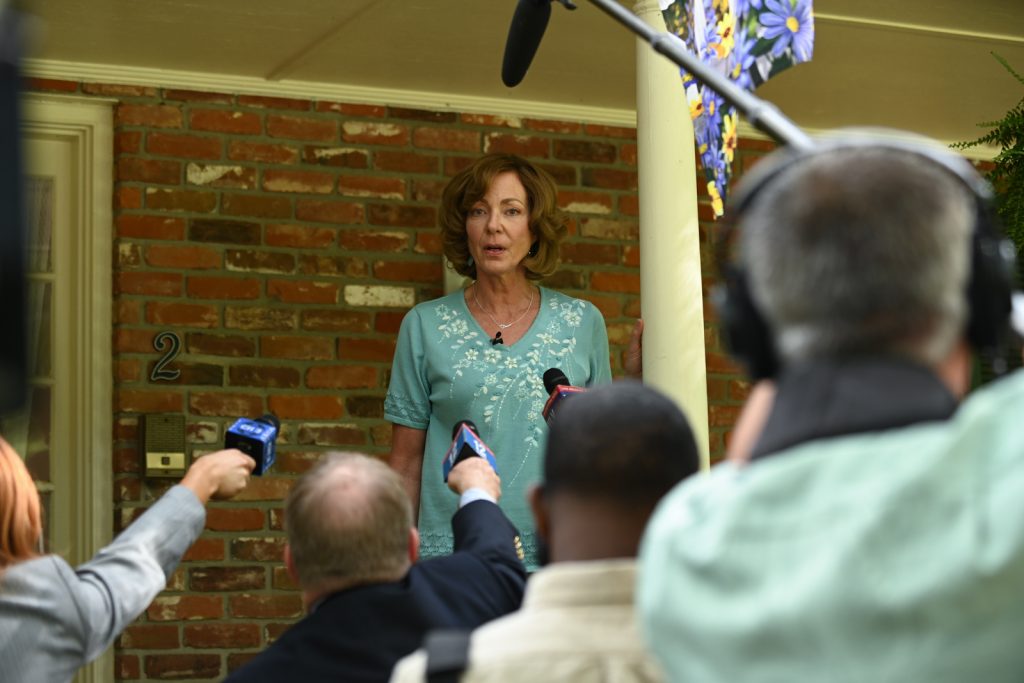May 20, 2023
by Carla Hay

Directed by Laurel Parmet
Culture Representation: Taking place in Kentucky in the mid-2000s, the dramatic film “The Starling Girl” has an all-white cast of characters representing the working-class and middle-class.
Culture Clash: A 17-year-old girl in a strict, religious community has a taboo affair with her married, 28-year-old youth pastor, while her troubled father struggles with his own personal issues.
Culture Audience: “The Starling Girl” will appeal primarily to people who are interested in movies that realistically explore issues of religion, teenage sexual awakenings, self-identity and moral hypocrisy.

“The Starling Girl” is a memorable coming-of-age story that artfully juxtaposes depictions of repression and rebellion without falling into the usual plot clichés. Eliza Scanlen gives a riveting performance as a 17-year-old experiencing self-discovery. It’s a movie that doesn’t offer easy answers to the main characters’ problems, but it’s made clear to viewers that these problems are made worse in a culture of denial and hypocrisy.
“The Starling Girl” (which had its world premiere at the 2023 Sundance Film Festival) is an impressive feature-film debut from writer/director Laurel Parmet. The movie takes place in Kentucky in the mid-2000s, but “The Starling Girl” has a timeless quality that transcends locations and generations, in the way that it depicts the relatable, restless energy of a teenager on the cusp of adulthood. The teenager wants the freedom of an adult, but legally the teenager has to be treated like a child. Depending on the teenager’s environment and individual personality, this transitional phase can either help or hurt a teenager’s emotional growth.
In “The Starling Girl,” the title character is 17-year-old Jemima “Jem” Starling (played by Scanlen), who is navigating her way to adulthood in a conservative Christian community. It’s a community where people of the female gender are expected to be subservient to people of the male gender. Women and girls in this community are monitored and judged for what they say, do and wear around men and boys. Something as simple as wearing an outfit that shows the outline of a bra underneath can be reason enough for a girl to get scolded or lectured to by an adult.
It’s what happens to Jem after a chaste dance performance that she does with some other local teenage girls at their community church. The girls all wear matching long white dresses. Dancing is a passion for Jem, who also likes to do choreography for the group. After their performance, which gets polite applause from the congregation, Jem is in a very good mood.
But her upbeat mood soon turns to despair when, after the church service, the church pastor’s wife Anne Taylor (played by K.J. Baker) says sternly to Jem in front of Jem’s family and some other people in the congregation: “Mrs. Stone has noticed that the bra is visible from your dress.” Jem’s homemaker mother Heidi Starling (played by Wrenn Schmidt) says apologetically, “We try to be very conscious, but sometimes things slip.”
Within the first 15 minutes of “The Starling Girl,” it becomes obvious that Jem’s parents, especially her mother, want to impress church leader Pastor Taylor (played by Kyle Secor) and his family. Pastor Taylor has two children: 28-year-old Owen Taylor (played by Lewis Pullman) and 17-year-old Ben Taylor (played by Austin Abrams), who is expected to be the one to date Jem and possibly be her future husband. Heidi in particular is enthusiastic about the possibility of Ben and Jem getting married, because the marriage would elevate the status of the Starling family in the community. Even though Ben seems to be attracted to Jem, she is not at all attracted to Ben, who is socially awkward and a little weird.
After being reprimanded about her bra being visible through her dress, Jem goes outside the church to a semi-secluded area of the lawn and cries in shame. Jem think she’s alone, but doesn’t see until it’s too late that Owen is nearby and has been watching her. He tries to start a conversation with her, but she abruptly leaves in embarrassment. It’s soon revealed that Jem has had a crush on Owen for a very long time.
Owen has recently come back to his hometown after spending some time as a missionary in Puerto Rico. Owen is married to a pious and perky woman named Misty Taylor (played by Jessamine Burgum), who is a big believer in sticking to religious traditions. By contrast, Owen is open to non-traditional methods of religious worship. And even though Owen has been appointed as the youth pastor of the church, what he really wants to do with his life is be a farmer.
Jem is also someone who is struggling with what is expected of her and what she really wants to do with her life. For now, Jem is expected to marry and start a family not long after she graduates from high school, but Jem thinks she doesn’t want to be a wife and mother until she’s much older and more emotionally mature. Her mother Heidi has already decided that Ben would be a good match for Jem, but when Jem expresses reluctance to date Ben, her mother dismisses any of Jem’s concerns. Jem’s more lenient father Paul Starling (played by Jimmi Simpson) tells Jem that she doesn’t have to make up her mind right away about whether or not to date Ben.
At home, Heidi is a prudish taskmaster who expects the family to closely follow all of their religious teachings. Jem is the oldest of five kids. Her siblings are Noah Starling (played by Chris Dinner), who’s about 15 or 16; Rebecca “Becca” Starling (played by Claire Elizabeth Green), who’s about 13 or 14; Sarah Starling (played by Ellie May), who’s about 6 or 7; and a toddler named Jeremy Starling (played by Kieran Sitawi). Out of all of Jem’s siblings, Rebecca is the one who has the closest emotional bond to Jem.
During another religious service at the local church, a teenager named Edmond Tike (played by Ike Harrell), who’s about 16 or 17 years old, gets up in front of the congregation to ask for their forgiveness for sins that he says he committed but he does not detail. Edmond looks humiliated and ashamed when he tells the congregation that he’s now a “cleansed man.” He gets a lukewarm response from the audience. Pastor Taylor’s attitude toward Edmond is that Edmond is like an unruly puppy that needs patience and needs to be trained.
In the youth group meeting after the church service, some of the assembled teenagers gossip about Edmond, by saying he had just come back from a severe religious camp, which is notorious as a scary place where kids in the community are sent for punishment. According to the gossip, Edmond was sent there because he was caught looking at porn on a computer. Jem says self-righteously, “That’s why you have to be so careful with technology. It’s the easiest way for Satan to get to you.”
But it won’t be long before Jem gets caught up in something that would be an even bigger sexual scandal than looking at porn. At the youth group meeting that Owen is leading for the first time, he makes the group members lie down on their backs and meditate. Most of the group members think this meditation method is bizarre, but Jem is intrigued and can see that Owen isn’t a traditional youth pastor.
Jem’s attraction to Owen deepens when the dance group’s adult leader Mrs. Baker quits, and Owen is the one who gets to decide what to do about it. Jem confidently pitches herself to be the group leader until an adult can be found to replace Mrs. Baker. Owen agrees to this idea because he likes Jem and thinks she’s a talented dancer.
Owen also knows that this decision will make Jem like him even more and be more loyal to him. Owen feels that most of the teens in the youth group don’t really like him because they think Owen is “different” and maybe too liberal. Jem also feels a little bit like an “outsider” in this community. Just like Owen, Jem thinks there are certain traditions in the community that she doesn’t necessarily want to follow.
Jem and Owen start to spend some more time alone together, and the attraction becomes mutual. Eventually, Owen and Jem open up to each other about their personal lives. Owen tells Jem that he’s miserable in his marriage to Misty, who wants to start a family with Owen, but Owen tells Jem that he doesn’t want to have kids with Misty. Owen says his dream would be to go back to Puerto Rico and start a farm. Jem has vague plans to possibly become a dance teacher after she graduates from high school.
Just as things are looking up for Jem as leader of the dance group and finding a new “friend” in Owen, her life at home starts to experience some turmoil. The day that Jem finds out that she’s going to lead the dance group, she comes home and accidentally walks in on her father sitting naked on his bed and snorting an unknown powder that was on his hand. Horrified and in shock, Jem quickly leaves the room and doesn’t say anything to anyone about what she saw.
It’s eventually revealed that before Paul got married and had a family, he used to have a wild life as a substance-abusing musician in a country/rock band named The Deadbeats, which didn’t make it past the level of playing bars and nightclubs. Paul recently found out that one of his former band mates committed suicide. And this news sends Paul on a downward spiral and relapse into secretive drinking and drugging. Heidi knows about Paul’s past, and it’s implied that she was the one who convinced him to become a sober, born-again Christian.
The rest of “The Starling Girl” shows the drama that happens in Jem’s family life, her new leadership role for the dance group, and the growing attraction between Jem and Owen. In Kentucky, 16 years old is the minimum age of consent for people to have sexual relations. What happens between Jem and Owen is no surprise. But the last third of “The Starling Girl” does have a few surprises that look authentic and not overly contrived for a movie.
Scanlen is absolutely fantastic in how she depicts a teenager feeling trapped while transitioning into adulthood. Jem goes through a sexual awakening that both fascinates and frightens her. Jem uses some of her feminine charms to get her way, but she also experiences the harsh realities of living in a sexist community that treats women and girls as inferior to men and boys. It’s a community that is quick to shame and blame women and teenage girls for the same things that men and teenage boys can often do without punishment.
One of the best things about “The Starling Girl” is how the cast members (especially Scanlen) express emotions without saying a word. It’s an essential reason why so much of this movie looks realistic in showing people who are living lives of quietly desperate repression. So much is left unsaid or denied by these characters, but their facial expressions and body language tell the real story.
“The Starling Girl” writer/director Parmet has accomplished a tricky feat of crafting a story that is specific yet universal. This gem of a movie is more than just about a teenage girl who wants to break free of her strict, religious environment. It’s about summoning the courage to be yourself, even if it means going through painful experiences of finding out who you really are. The ending of “The Starling Girl” won’t satisfy some viewers who want more answers, but the movie has a clear message that finding some kind of happiness in life is what you make of it.
Bleecker Street released “The Starling Girl” in select U.S. cinemas on May 12, 2023, with an expansion to more U.S. cinemas on May 19, 2023. The movie will be released on digital and VOD on July 11, 2023.






